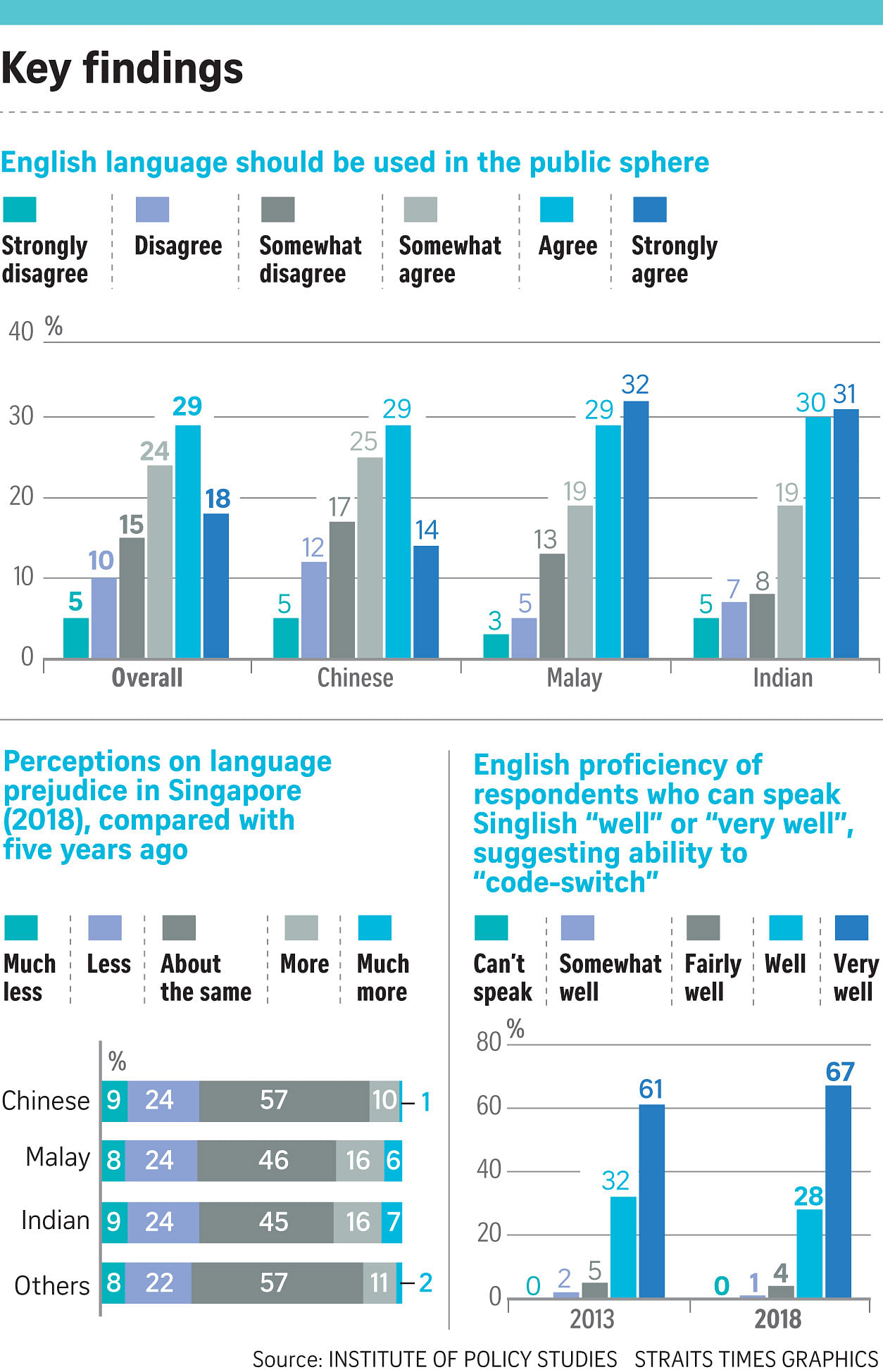There is wide acceptance that English should be the language used as far as possible in the public space, although there should still be space for other languages as diversity is a cornerstone of Singaporean identity, a study has found.
The findings are the result of a study by the Institute of Policy Studies on race, religion and language, where researchers analysed data from two sets of surveys in 2013 and 2018. Each survey had more than 4,000 respondents.
Up to 71 per cent of respondents across ethnic groups in 2018 indicated that they feel inter-ethnic interaction in the public space should be in English.
The researchers said a different scale was used for this part of the survey in 2013 and 2018, and the findings might not be comparable.
Dr Mathew Mathews, one of the researchers who authored the Language Proficiency, Identity and Management study, told reporters in a press briefing via teleconferencing yesterday that this shows Singaporeans care about cohesion.
"In general, the trend has been that people do feel, as far as aspiration is concerned, that we should try to reduce as much social exclusion as possible," he said, adding that this is a healthy aspiration.
Still, there has been peaceful coexistence of a number of languages in Singapore, and this diversity should remain as it is "integral in shaping a uniquely multicultural identity", the study noted.
It found that there are perceived differences in "linguistic capital" across various languages, with 59 per cent of Chinese Singaporeans feeling that Mandarin would help them in work or business settings locally.
Less than half of the ethnic minorities felt the same way in the case of their own mother tongue languages - the figure was 44 per cent for Malay respondents and 45 per cent for Indian respondents.
But over the five-year period from 2013 to 2018, the study also found that the perception of language prejudice has largely remained the same or gone down, although over a fifth of some ethnic minorities felt there was more language prejudice now, which the researchers said "merits further scrutiny".
The perception of language hierarchies can lead to the perception of linguistic discrimination if not managed properly, the study noted.
The study also found that Chinese and Indians have increasingly identified with English as a main language, as opposed to their mother tongues or heritage languages - 32 per cent of Chinese respondents indicated this in 2018, up from 30 per cent in 2013; while for Indian respondents, it was 43 per cent, up from 34 per cent.
Fewer respondents identified with their mother tongues in 2018 across both ethnic groups.
Meanwhile, the links between Malay language and identity have been sustained, Dr Mathews noted.
In 2013 and 2018, 36 per cent of Malay respondents said they identified most with the Malay language.
Nevertheless, the percentage of Malay respondents who identify with English also went up, from 24 per cent in 2013 to 33 per cent in 2018.
In the 2018 survey, there was an additional component examining respondents' perceptions of Singlish as part of national identity, as well as the appropriateness of its usage.
About half of the respondents felt that speaking Singlish gives Singaporeans a sense of identity, and that it is an important part of the country's culture they hope will not be lost over time.
A similar proportion felt that people do not really bother whether someone speaks standard English or Singlish.
However, the study found that Singlish is considered most appropriate in private settings such as among family and friends, but not in educational settings and official state communications.
A large proportion of respondents who identified most with Singlish, or felt they were proficient in speaking Singlish, also indicated strong proficiencies in speaking standard English, which researchers said suggests the ability to "code-switch" between the two when necessary.
Asked to comment on the relevance of the study findings to the Covid-19 pandemic period, Mr Melvin Tay, a researcher who helped author the study, said it is important for a society to feel a sense of identity.
"During this season, as a society, we want to find unity and come together as we deal with the issues of the pandemic and of course the aftermath of it, the economic loss.
"I think the findings provide us some confidence that Singaporeans in general don't feel exclusion based on language. Even among minority communities, most are quite satisfied... Aspirationally, we have a strong sense that the English language allows us to interact with people across communities and ethnic backgrounds."



